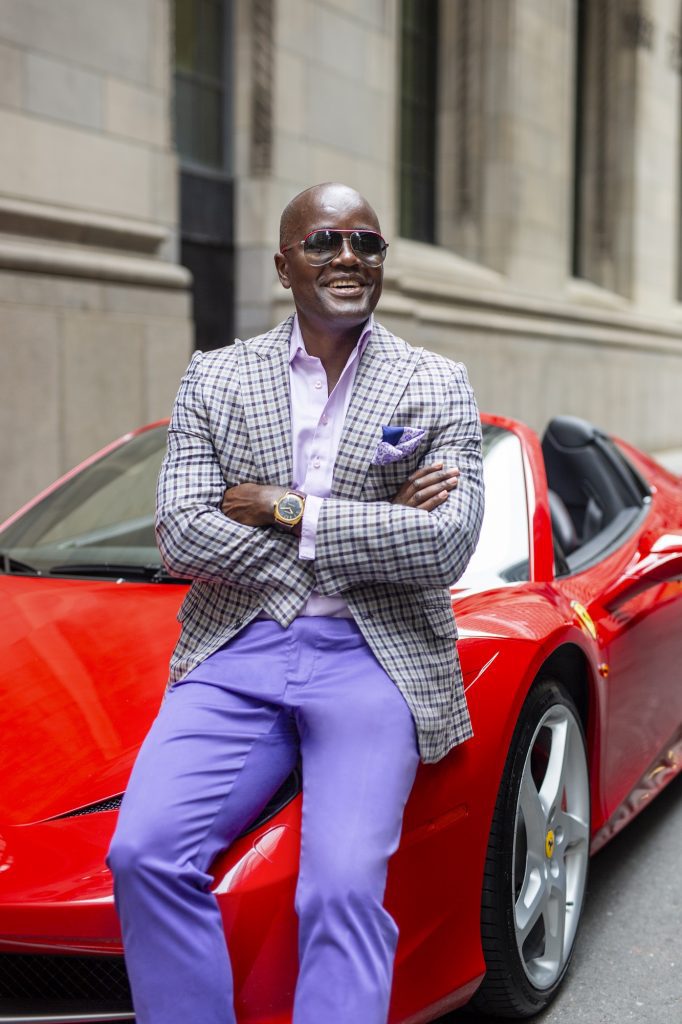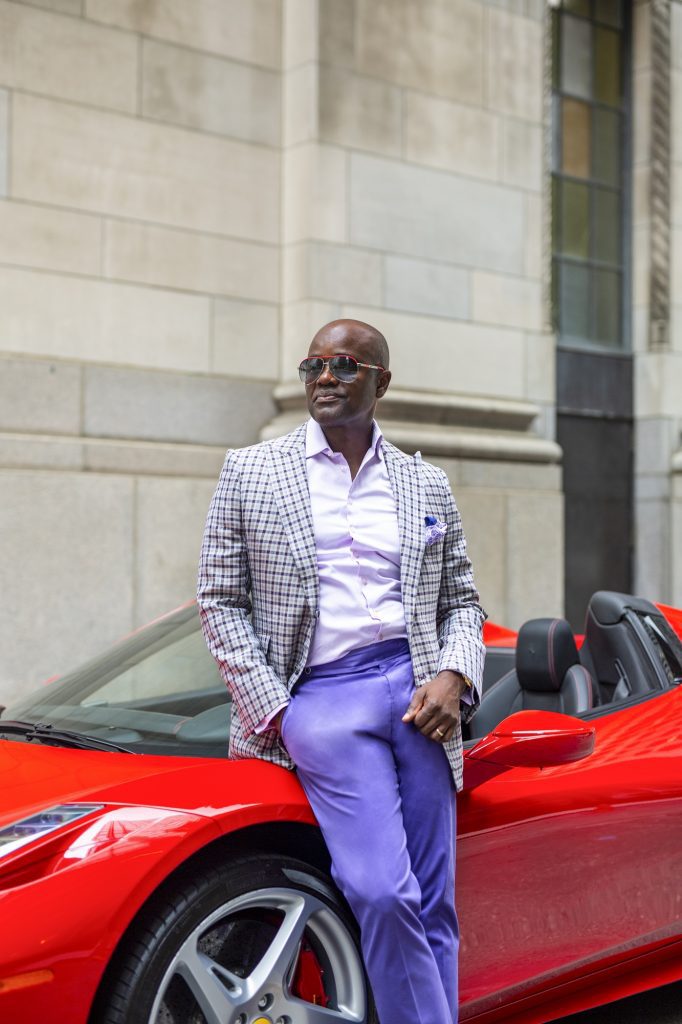Photography by Elaine Fancy
When you consider it, there are a lot of striking similarities between the world of luxury cars and ambitious entrepreneurs: high-speed performance, the pursuit of excellence, and a dedication to a craft. In our new series, Driven, we profile Canada’s most powerful individuals and talk about their journey to the top, and their love of beautiful cars.
Wes Hall started his company, Kingsdale Advisors, to help businesses communicate better with shareholders. Specifically, he created it in response to Canada’s lack of firms dedicated to servicing the needs of activist investors — an individual or group of shareholders who try to influence significant change within a public company. Since 2003, he’s been the man to call on the matter and has been responsible for some of the most high-profile cases to come out of Canada, like Tim Horton’s $12.5B merger with Burger King or Canadian Pacific Railway’s CEO shakeup.
On a sunny day in Toronto, we took a spin with Hall in his Ferrari 458 Spider to talk about his humble roots, what he’s learned about leaders along the way, and his definition of success.




You’ve been sought after to lead some very high profile deals and activist campaigns in North America, many of which have involved a shift in leadership or direction. In your experience, what do you think defines a great leader?
The only job that the board of a public company, or any company for that matter, has is to hire and fire the CEO. We’ve seen a lot of companies get that very wrong. We really saw that with the Canadian Pacific Railway, where they had a great group of board members who were all former CEOs of some of the biggest companies in Canada, but had a CEO that was underperforming. So much so that that the railroad was the worst performing railroad in North America. They were the bottom of the pile.
This activist investor went to management and said, “Listen, we believe that the company is a great one because they have a captive audience and a product that nobody’s making anymore, but it’s devoid of leadership. We would like to have a change in the CEO and potentially change some of the management and board members so we can reinvigorate energy into this company.”
The company disagreed and ultimately, a campaign was launched. We put a new CEO in place. I think at the time, the company was about a billion and a half dollars in market value, and went up to close to $10 billion in about 18 months or so.
That was a clear leadership gap. All we did in that company was change the CEO and some of the board members. Everything remained the same. It’s all about management, how you manage your assets, and motivate people. It’s about how you deal with your competition and your client base. If you get that right, you can lead any industry for a very long time because the competition is just playing catch up, especially if they don’t have the capability to do the things that you’re doing well.
You’ve been called “The Fixer.” When it comes to negotiating and managing a lot of different egos, what are some of the core strategies that you have found to be successful?
This is an ego-driven business. Some of these CEOs make $20 to $50 million a year, and you’re going to these people and telling them that they’re doing a terrible job running a company. When an activist selects a company as a target, they don’t select bad companies. They select great ones that are poorly managed. If you can bridge the management gap, then you can create value in that business.
If you want to get a receptive hearing from the board, you can’t just walk into the boardroom and tell everyone that they are doing a horrible job. Don’t kick the boardroom door down, just tap on it gently. And when they open up, you go in and say, “Hey, I love this company. I love these parts of it, but there are certain aspects of it that I think could change and we can help you in that area.” If you do it that way, you’re not bruising people’s egos. They’ll be more willing to listen to you. What we see with US activists, in particular, is that they come in with a lot of bravado and just hammer at the things that these companies are doing wrong, and they become entrenched. And as a result of that entrenchment, it becomes difficult to get a deal done. That initial approach is critical in terms of the outcome that you’re going to get. You’re going to either have someone who’s going to fight you to the death or someone who’s going to be willing to sit down with you and work out a situation.


You’ve got to figure out what causes conflict. If you’re managing people, what causes those people to have conflict with you or with the company? I’m in the people business. My assets go up and down the elevator every day. My job is to motivate my team and give them enough latitude to do their work without being on their case all the time. How you approach your employees to motivate them makes a huge difference in whether they stay with you. In personal life, it’s the same thing. It’s about reading people. A lot of people don’t understand how to read body language. When we do these activist campaigns, part of my job is to go to investor meetings with my clients and read the body language and let my client know whether or not we have a receptive person in the room.
How do you arrive at that conclusion?
There are little things that you see. For example, where are they taking notes? At what point did they start to write? When you say certain things, did they connect with them? You know if they’re buying what you’re selling when they ask a lot of questions and are very engaged. It doesn’t necessarily mean that you’re doing well, but it may mean that there are certain things in the conversation that they liked and you need to expand a little more on, especially when you go into that next meeting.
You were born in Jamaica and raised by your grandmother. How much of your past informs the values of your day-to-day?
All of it. I have 13 brothers and sisters, and my grandmother raised a lot of us, and also our cousins. And she did it on her own. She would do everything to make sure that we were fed and that we were educated, and she did it on her own. When I look at that work ethic that I was exposed to at a very young age, I know that I couldn’t fail in what I did. I saw what success looks like. She was a successful person in terms of how she was raising her grandkids and her work ethic. I wanted to emulate that.
How has that interpretation of success evolved as you’ve progressed through life?
People ask me who my role models are and I never really point to people who have money. I point to people who have a balance in their life. People who have great families, the respect of their kids, their spouse, long relationships, those types of things. That, to me, is success. And if you put some money on top of it, that’s great. That means you can take nice vacations and buy nice things. But ultimately, it’s how you’re perceived by your family.
What grounds you?
The fact that I’m in a place where I don’t belong. I came from this tin shack in Jamaica and now I’m working on Bay Street and I ask myself, “How did this happen?” If you told that small child in the tin shack that he’d one day run a company where all these people — billionaires and Harvard-educated people —would come to him for advice and pay a lot of money for it, he’d just laugh and say it’s never going to happen. That it’s impossible. Yet, here I am doing it.
You’re a fan of beautiful cars. What drew you to this world?
I like nice things. For me, it’s kind of a reward for what I’ve done. It’s almost like validation that you’ve done something that most people can’t do or haven’t been able to do. I also admire the craftsmanship and accomplishment in design. To just listen to the roar of the engine when you’re driving it, or the mood that it puts you in when you sit in it and start driving, that’s really what you appreciate about it. It’s almost like it is a symbol to prove to myself and others that I’ve done something interesting.










